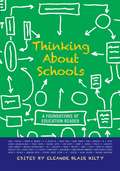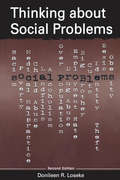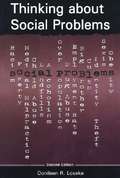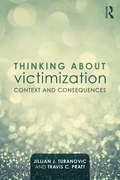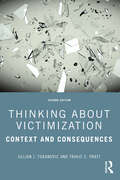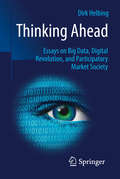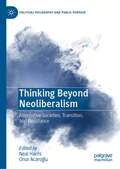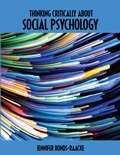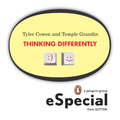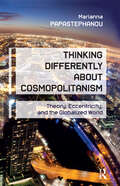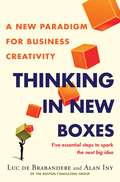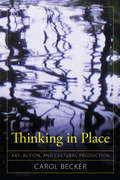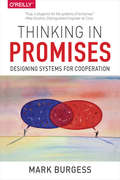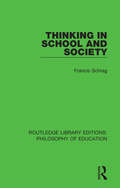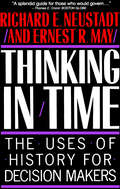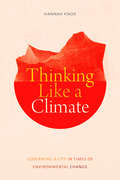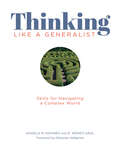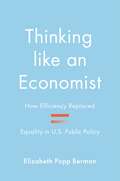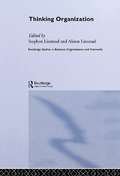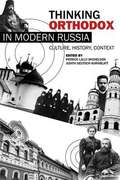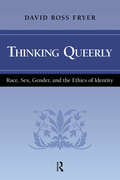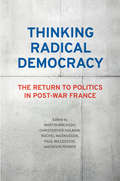- Table View
- List View
Thinking about Schools
by Eleanor Blair HiltyHilty collects dozens of classic and contemporary essays designed to engage students and encourage critical thinking and discussion on topics relating to schools and education. The book is divided into five parts. Part I discusses the aims and purposes of education, part II the content of the curriculum, part III the roles and responsibilities of teachers, part IV the roles and responsibilities of students, and part V the issues that impact 21st century schools. Each part includes an introduction, discussion questions, a guide to further reading and related resources. Annotation ©2011 Book News, Inc. , Portland, OR (booknews. com)
Thinking about Schools
by Eleanor Blair HiltyDesigned specifically for students with little or no education background, Thinking About Schools is an essential collection of classic and contemporary readings that provides a complete, balanced overview of educational foundations. Anchored in classic scholarship from the 1960s to today, this book also incorporates a number of thought-provoking popular essays that will engage students and encourage critical thinking about vital issues concerning the purpose of education, curriculum content, the roles and responsibilities of students and teachers, and new directions for education in the twenty-first century. In addition to selecting each reading for its impact and accessibility, editor Eleanor Blair Hilty further promotes student comprehension by including introductions, discussion questions, guides to further reading, and related resources for each of the five parts.
Thinking About Social Problems: An Introduction to Constructionist Perspectives (Social Problems And Social Issues Ser.)
by Donileen LosekeThe new second edition of this distinctive and widely adopted textbook brings into the classroom an overview of how images of social problems can shape not only public policy and social services, but also the ways in which we make sense of ourselves and others. It introduces two primary changes. First, some attention is devoted to the "new social movements" that emphasize social change through identity transformation rather than through structural change. Second, the text now also looks more closely at the importance of emotions in constructing public consciousness of social problems.When the first edition was published, Teaching Sociology noted, "Loseke does a superb job explaining the relationship between sociology and social problems in a text that is very well research and engaging, yet with tremendous attention to detail and accuracy... [W]ould provide a solid base for any social problems class." Contemporary Sociology wrote that the book is "engagingly well written in a personal, unpretentious style, and well informed by the author's knowledge of the professional literature."
Thinking About Social Problems: An Introduction to Constructionist Perspectives (2nd edition)
by Donileen R. LosekeThis second edition of a classroom text devotes more attention to new social movements that emphasize social change through identity transformation rather than through structural change, and looks more closely at the importance of emotion in constructing public consciousness of social problems. The author teaches at the University of South Florida. Annotation (c)2003 Book News, Inc., Portland, OR (booknews.com)
Thinking About Victimization: Context and Consequences
by Jillian J. Turanovic Travis C. PrattBringing together cutting-edge theory and research that bridges academic disciplines from criminology and criminal justice, to developmental psychology, sociology, and political science, Thinking About Victimization offers an authoritative, comprehensive, and refreshingly accessible overview of scholarship on the nature, sources, and consequences of victimization. Written in a lively style with sharp storytelling and an appreciation of international research on victimization, this book is rooted in a healthy respect for criminological history and the foundational works in victimization studies. It provides a detailed account of how different data sources can influence our understanding of victimization; of how the sources of victimization—individual, situational, and contextual—are complicated and varied; and of how the consequences of victimization—personal, legal, and political—are just as complex. This book also engages with contemporary issues such as cybervictimization, intimate partner violence and sexual victimization, prison violence and victimization, and terrorism and state-sponsored violence. Thinking About Victimization is essential reading for advanced courses in victimization offered in criminology, criminal justice, sociology, social work, and public policy departments. With its unapologetic reliance on theory and research combined with its easy readability, undergraduate and graduate students alike will find much to learn in these pages.
Thinking About Victimization: Context and Consequences
by Jillian J. Turanovic Travis C. PrattBringing together cutting-edge theory and research that bridges academic disciplines from criminology and criminal justice, to developmental psychology, sociology, and political science, Thinking About Victimization offers an authoritative and refreshingly accessible overview of scholarship on the nature, sources, and consequences of victimization. This book integrates empirical research and victimization theory and is written in a lively style, with sharp storytelling and an appreciation of international research on victimization. Rooted in a healthy respect for criminological history and the important foundational works in victimization studies, it provides a detailed account of how different data sources can influence our understanding of victimization; of how the sources of victimization—individual, situational, and contextual—are complicated and varied; and of how the consequences of victimization—personal, social, and political—are just as complex. Thinking About Victimization also engages with contemporary issues such as sexual victimization and intimate partner violence, victimization in schools, cybervictimization, and prison victimization, as well as terrorism and state-sponsored violence. The second edition reflects new research developments in victimology, including updated discussions on the COVID-19 pandemic, police brutality, increases in crime, and school shootings. Thinking About Victimization is essential reading for advanced courses in victimization offered in criminology, criminal justice, sociology, health, and social work departments. With its unapologetic reliance on theory and research combined with its easy readability, undergraduate and graduate students alike will find much to learn in these pages.
Thinking About Women: Sociological Perspectives on Sex and Gender
by Margaret L. AndersenAppropriate for Sociology of Gender and Sociology of Women courses. This text examines how gender operates in every aspect of society and how the male and female experience are constructs of our social institutions.
Thinking Ahead - Essays on Big Data, Digital Revolution, and Participatory Market Society
by Dirk HelbingThe rapidly progressing digital revolution is now touching the foundations of the governance of societal structures. Humans are on the verge of evolving from consumers to prosumers, and old, entrenched theories – in particular sociological and economic ones – are falling prey to these rapid developments. The original assumptions on which they are based are being questioned. Each year we produce as much data as in the entire human history - can we possibly create a global crystal ball to predict our future and to optimally govern our world? Do we need wide-scale surveillance to understand and manage the increasingly complex systems we are constructing, or would bottom-up approaches such as self-regulating systems be a better solution to creating a more innovative, more successful, more resilient, and ultimately happier society? Working at the interface of complexity theory, quantitative sociology and Big Data-driven risk and knowledge management, the author advocates the establishment of new participatory systems in our digital society to enhance coordination, reduce conflict and, above all, reduce the “tragedies of the commons,” resulting from the methods now used in political, economic and management decision-making. The authorPhysicist Dirk Helbing is Professor of Computational Social Science at the Department of Humanities, Social and Political Sciences and an affiliate of the Computer Science Department at ETH Zurich, as well as co-founder of ETH’s Risk Center. He is internationally known for the scientific coordination of the FuturICT Initiative which focuses on using smart data to understand techno-socio-economic systems. “Prof. Helbing has produced an insightful and important set of essays on the ways in which big data and complexity science are changing our understanding of ourselves and our society, and potentially allowing us to manage our societies much better than we are currently able to do. Of special note are the essays that touch on the promises of big data along with the dangers...this is material that we should all become familiar with!” Alex Pentland, MIT, author of Social Physics: How Good Ideas Spread - The Lessons From a New Science "Dirk Helbing has established his reputation as one of the leading scientific thinkers on the dramatic impacts of the digital revolution on our society and economy. Thinking Ahead is a most stimulating and provocative set of essays which deserves a wide audience.” Paul Ormerod, economist, and author of Butterfly Economics and Why Most Things Fail. "It is becoming increasingly clear that many of our institutions and social structures are in a bad way and urgently need fixing. Financial crises, international conflicts, civil wars and terrorism, inaction on climate change, problems of poverty, widening economic inequality, health epidemics, pollution and threats to digital privacy and identity are just some of the major challenges that we confront in the twenty-first century. These issues demand new and bold thinking, and that is what Dirk Helbing offers in this collection of essays. If even a fraction of these ideas pay off, the consequences for global governance could be significant. So this is a must-read book for anyone concerned about the future." Philip Ball, science writer and author of Critical Mass “This collection of papers, brought together by Dirk Helbing, is both timely and topical. It raises concerns about Big Data, which are truly frightening and disconcerting, that we do need to be aware of; while at the same time offering some hope that the technology, which has created the previously unthought-of dangers to our privacy, safety and democracy can be the means to address these dangers by enabling social, economic and political participation and coordination, not possible in the past. It makes for compelling reading and I hope for timely action.”Eve Mitleton-Kelly, LSE, author of Corporate Governance and Complexity Theory and editor of Co-evolution of Intelligent Socio-
Thinking Beyond Neoliberalism: Alternative Societies, Transition, and Resistance (Political Philosophy and Public Purpose)
by Neal Harris Onur AcaroğluThis book brings together leading academics and activists to address the possibilities for qualitative social change beyond neoliberalism, providing introductory essays on alternative societies, transition, and resistance. Bringing together discussions on universal basic income, actually existing communism, parecon, circular economies, workers co-operatives, ‘fully automated luxury communism,' trade unionism, and party politics, the volume provides one of the first scholarly interventions to systematically evaluate possibilities for transition and resistance across theoretical, political, and disciplinary traditions.
Thinking Critically about Social Psychology
by Jennifer Bonds-RaackeThinking Critically About Social Psychology is written in a format that makes it easy to understand the information while still showing the author’s knowledge in the field. Current examples are used, such as the riots in Ferguson, to illustrate some of the topics of study. The “thinking critically boxes” are fun and an effective way to test oneself or consider how the topics applied to life experiences.
Thinking Differently
by Tyler Cowen Temple GrandinFor the first time ever renowned economist and coauthor of one of the world's most influential economic blogs, Tyler Cowen, sits down with best-selling author and autism advocate Temple Grandin for a lively in-depth exploration of the value of autism in the modern world. Just as he does in his book Create Your Own Economy, Cowen argues that individuals on the autism spectrum are integral to the world's many faceted economy; they create all kinds of value in financial, intellectual, cultural and even political markets. Their talents regarding the organization of information are of critical value now, and they are talents we all share to some extent. Cowen and Grandin discuss the nature of autistic thinking, the historical, future and global contributions it can make, as well as the damage done by the stigma currently associated with the autistic label. Valuing the unique and specialized autistic cognitive abilities of each member of society--understanding how we think differently--is the key to the unimaginable prosperity the modern world has yet to offer.
Thinking Differently About Cosmopolitanism: Theory, Eccentricity, and the Globalized World
by Marianna PapastephanouCosmopolitanism and relevant notions are widely discussed in philosophy of education and educational studies more generally. There is a vast literature on the topic that often invites conceptual discussion and requires some work in the direction of crucial clarifications. Thinking Differently About Cosmopolitanism argues that a new conception of cosmopolitanism is needed and addresses this need by formulating a conception of cosmopolitanism as an "eccentric" ethico-political ideal. Such cosmopolitanism is eccentric in the sense that it decenters the self, it cultivates centrifugal virtues, and it questions the concern for the globally enriched self. In this book, Papastephanou lays the foundation for a more refined conception of the topic, and provides a fruitful interdisciplinary discussion of its relation to globalization, Eurocentricism, developmentalism, and modernity.
Thinking in New Boxes: A New Paradigm for Business Creativity
by Alan Iny Luc De BrabandereWhen BIC, manufacturer of disposable ballpoint pens, wanted to grow, it looked for an idea beyond introducing new sizes and ink colors. Someone suggested lighters. LIGHTERS? With an idea that seemed crazy at first, that bright executive, instead of seeing BIC as a pen company--a business in the PEN "box"--figured out that there was growth to be found in the DISPOSABLE "box." And he was right. Now there are disposable BIC lighters, razors, even phones. The company opened its door to a host of opportunities. IT INVENTED A NEW BOX. Your business can, too. And simply thinking "out of the box" is not the answer. True ingenuity needs structure, hard analysis, and bold brainstorming. It needs to start THINKING IN NEW BOXES --a revolutionary process for sustainable creativity from two strategic innovation experts from The Boston Consulting Group (BCG). To make sense of the world, we all rely on assumptions, on models--on what Luc de Brabandere and Alan Iny call "boxes." If we are unaware of our boxes, they can blind us to risks and opportunities. This innovative book challenges everything you thought you knew about business creativity by breaking creativity down into five steps: * Doubt everything. Challenge your current perspectives. * Probe the possible. Explore options around you. * Diverge. Generate many new and exciting ideas, even if they seem absurd. * Converge. Evaluate and select the ideas that will drive breakthrough results. * Reevaluate. Relentlessly. No idea is a good idea forever. And did we mention Reevaluate? Relentlessly. Creativity is paramount if you are to thrive in a time of accelerating change. Replete with practical and potent creativity tools, and featuring fascinating case studies from BIC to Ford to Trader Joe's, Thinking in New Boxes will help you and your company overcome missed opportunities and stay ahead of the curve. This book isn't a simpleminded checklist. This is Thinking in New Boxes. And it will be fun. (We promise.) Advance praise for Thinking in New Boxes "Thinking in New Boxes is a five-step guide that leverages the authors' deep understanding of human nature to enable readers to overcome their limitations and both imagine and create their own futures. This book is a must-read for people living and working in today's competitive environment."--Ray O. Johnson, Ph.D., chief technology officer, Lockheed Martin "Thinking In New Boxes discusses what I believe to be one of the fundamental shifts all companies/brands need to be thinking about: how to think creatively, in order to innovate and differentiate our brands. We need to thrive and lead in a world of accelerating change and this book challenges us to even greater creativity in our thinking. One of the best business books I've read in a long time."--Jennifer Fox, CEO, Fairmont Hotels & Resorts "As impressive as teaching new tricks to old dogs, Thinking in New Boxes is both inspirational and practical--a comprehensive, step-by-step guide to sharpening one's wits in order to harness creativity in the workplace."--Peter Gelb, general manager, Metropolitan Opera
Thinking in Place: Art, Action, and Cultural Production
by Carol BeckerCarol Becker, preeminent arts educator and contributor to leading art magazines, offers a beautifully poignant meditation on the role of place in artistic creativity. She focuses on place as a historical, physical entity and a conceptual site where ideas come into meaning. The book explores places from the coal-mining towns of western Pennsylvania, to the Birla House where Gandhi was shot, to the sinking city of Venice. A cross between theory, memoir, and history, her writing creates the experiential effect of being in specific places as well as imagining the evolution of ideas as they are manifested in museums and often become agents for social change.
Thinking in Promises: Designing Systems for Cooperation
by Mark BurgessImagine a set of simple principles that could help you to understand how parts combine to become a whole, and how each part sees the whole from its own perspective. If such principles were any good, it shouldn't matter whether we're talking about humans on a team, birds in a flock, computers in a datacenter, or cogs in a Swiss watch. A theory of cooperation ought to be pretty universal, so we should be able to apply it both to technology and to the workplace.Such principles are the subject of Promise Theory, and the focus of this insightful book. The goal of Promise Theory is to reveal the behavior of a whole from the sum of its parts, taking the point of the parts rather than the whole. In other words, it is a bottom-up, constructionist view of the world. Start Thinking in Promises and find out why this discipline works for documenting system behaviors from the bottom-up.
Thinking in School and Society (Routledge Library Editions: Philosophy of Education #16)
by Francis SchragIn this book, first published in 1988, the author integrates relevant ideas from philosophy, psychology, sociology, economics and political science to provide a comprehensive analysis of the problem of education for thinking. Professor Schrag takes account of the classroom as well as the larger society, and includes practical recommendations for creating new settings designed to enhance students’ thoughtfulness.
Thinking in Systems: A Primer
by Donella H. MeadowsDonella Meadows (1941-2001) was regarded as a pioneer in the environmental science and sustainability movements. This, her final book, is edited by the Sustainability Institute's Diana Wright. The book can be described as a primer that offers insights into problem solving in areas ranging from personal to global. It explains systems thinking as a tangible much-needed skill in dealing with global issues, and not as a series of equations. The book is straightforward and clearly written. Annotation ©2009 Book News, Inc. , Portland, OR (booknews. com)
Thinking in Time: The Uses of History for Decision Makers
by Richard E. NeustadtHow to use history to make correct decisions, when it's all too easy to use it to justify bad decisions.
Thinking Like a Climate: Governing a City in Times of Environmental Change
by Hannah KnoxIn Thinking Like a Climate Hannah Knox confronts the challenges that climate change poses to knowledge production and modern politics. Drawing on ethnographic fieldwork among policy makers, politicians, activists, scholars, and the public in Manchester, England—birthplace of the Industrial Revolution—Knox explores the city's strategies for understanding and responding to deteriorating environmental conditions. Climate science, Knox argues, frames climate change as a very particular kind of social problem that confronts the limits of administrative and bureaucratic techniques of knowing people, places, and things. Exceeding these limits requires forging new modes of relating to climate in ways that reimagine the social in climatological terms. Knox contends that the day-to-day work of crafting and implementing climate policy and translating climate knowledge into the work of governance demonstrates that local responses to climate change can be scaled up to effect change on a global scale.
Thinking Like a Generalist: Skills for Navigating a Complex World
by Angela Kohnen Wendy SaulWhat can we teach kids today that will have utility ten or fifteen years from now? Angela Kohnen and Wendy Saul propose an approach to information literacy that goes beyond the teaching of discreet, easily outdated skills. Instead they use activity to help students build identities as curious individuals empowered to ask their own questions and able to navigate their information-filled world in pursuit of credible answers. A generalist is curious, open-minded, skeptical, and persistent in their quest for information. Thinking Like a Generalist: Skills for Navigating a Complex World demonstrates what it means to take a generalist stance in instruction and provides a set of teaching tools to be able to pass those skills to students'sskills that will transfer beyond the walls of the classroom. Inside you'll find the following: A thorough introduction to what it means to be a generalist, and how to develop the practices and tools that help generalists navigate the world we live inA focus on the teacher becoming a generalist and tips for modeling those practices in the classroomDetailed instructions on how to write a unit of study that emphasizes generalist literacy skills and includes an overview and examples of five different unitsHow to use the authors' read-aloud-think-aloud strategy to orient students to generalist tools and practicesThe ideas, strategies, and examples Thinking Like a Generalist will give you the tools to think like a generalist and then pass that knowledge on to your students, guiding them to become inquisitive, lifelong learners and preparing them for a future that we can't yet imagine.
Thinking like an Economist: How Efficiency Replaced Equality in U.S. Public Policy
by Elizabeth Popp BermanThe story of how economic reasoning came to dominate Washington between the 1960s and 1980s—and why it continues to constrain progressive ambitions todayFor decades, Democratic politicians have frustrated progressives by tinkering around the margins of policy while shying away from truly ambitious change. What happened to bold political vision on the left, and what shrunk the very horizons of possibility? In Thinking like an Economist, Elizabeth Popp Berman tells the story of how a distinctive way of thinking—an “economic style of reasoning”—became dominant in Washington between the 1960s and the 1980s and how it continues to dramatically narrow debates over public policy today.Introduced by liberal technocrats who hoped to improve government, this way of thinking was grounded in economics but also transformed law and policy. At its core was an economic understanding of efficiency, and its advocates often found themselves allied with Republicans and in conflict with liberal Democrats who argued for rights, equality, and limits on corporate power. By the Carter administration, economic reasoning had spread throughout government policy and laws affecting poverty, healthcare, antitrust, transportation, and the environment. Fearing waste and overspending, liberals reined in their ambitions for decades to come, even as Reagan and his Republican successors argued for economic efficiency only when it helped their own goals.A compelling account that illuminates what brought American politics to its current state, Thinking like an Economist also offers critical lessons for the future. With the political left resurgent today, Democrats seem poised to break with the past—but doing so will require abandoning the shibboleth of economic efficiency and successfully advocating new ways of thinking about policy.
Thinking Organization (Routledge Studies in Business Organizations and Networks)
by Stephen Linstead Alison LinsteadDrawing on both analytical and continental traditions, this thought-provoking book takes a balanced look at the contributions philosophy can make to improving our understanding of what it means to organize. The essays consider three areas: representing organization, knowing organization, and the becoming of organization. With originality and flair, the contributors make a powerful case for the need for a new philosophy of management and organization.
Thinking Orthodox in Modern Russia
by Patrick Lally Michelson Judith Deutsch Kornblatt"Thinking Orthodox in Modern Russia" illuminates the significant role of Russian Orthodox thought in shaping the discourse of educated society during the imperial and early Soviet periods. Bringing together an array of scholars, this book demonstrates that Orthodox reflections on spiritual, philosophical, and aesthetic issues of the day informed much of Russia's intellectual and cultural climate. Volume editors Patrick Lally Michelson and Judith Deutsch Kornblatt provide a historical overview of Russian Orthodox thought and a critical essay on the current state of scholarship about religious thought in modern Russia. The contributors explore a wide range of topics, including Orthodox claims to a unique religious Enlightenment, contests over authority within the Russian Church, tensions between faith and reason in academic Orthodoxy, the relationship between sacraments and the self, the religious foundations of philosophical and legal categories, and the effect of Orthodox categories in the formation of Russian literature. "
Thinking Queerly
by David Ross FryerQueer theory and the gay rights movement historically have been in tension, with the former critiquing precisely the identity politics on which the latter relies. Yet neither queer theory, in its predominately poststructuralist form, nor the gay rights movement, with its conservative "inclusionary" aspirations, has adequately addressed questions of identity or the political struggles against normativity that mark the lives of so many queer people. Taking on issues of race, sex, gender, and what he calls "the ethics of identity," Fryer offers a new take on queer theory-one rooted in phenomenology rather than poststructuralism-that seeks to put postnormative thinking at its center. This provocative book gives us a glimpse of what "thinking queer" can look like in our "posthumanist age."
Thinking Radical Democracy
by Rachel Magnusson Devin Penner Martin Breaugh Paul Mazzocchi Christopher HolmanThinking Radical Democracy is an introduction to nine key political thinkers who contributed to the emergence of radical democratic thought in post-war French political theory: Hannah Arendt, Maurice Merleau-Ponty, Pierre Clastres, Claude Lefort, Cornelius Castoriadis, Guy Debord, Jacques Rancière, Étienne Balibar, and Miguel Abensour.The essays in this collection connect these writers through their shared contribution to the idea that division and difference in politics can be perceived as productive, creative, and fundamentally democratic. The questions they raise regarding equality and emancipation in a democratic society will be of interest to those studying social and political thought or democratic activist movements like the Occupy movements and Idle No More.
